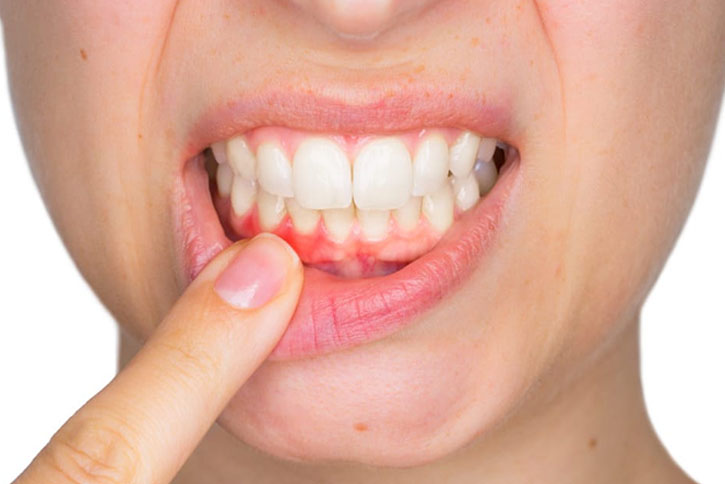Have you ever taken your toothbrush out of your mouth and see blood? Frightening, isn’t it? More than likely your gums are bleeding! Not many people understand just why their gums are bleeding. With the help of AMG Dental Group and Dr. Guerra, you can prevent and treat many of the causes of bleeding gums.

A variety of different factors may be associated with bleeding gums. With the exception of a few, most of these problems involve plaque or bacteria that settle around the gum line.
If you are only flossing the week before your visit to Delaware Periodontics, it is likely that your gums will bleed. Consistent flossing is important for plaque removal to prevent cavities and to reduce gum sensitivity and bleeding.
Contrary to popular belief, you can brush your teeth too hard. Aggressive brushing may cause the gums to bleed. Additionally, using a toothbrush that is too strong for your gums can increase the likelihood of bleeding gums.
Gum disease is commonly associated with bleeding gums. If your gums are bleeding, despite consistent flossing and brushing, you may have gum disease.
Bleeding gums can also be an indicator of more serious conditions, such as leukemia. While your gums are most likely bleeding for a less serious reason, be sure to have a dental examination to be reassured.
There could be a variety of reasons why your gums are bleeding. Typically, bleeding gums are exacerbated by plaque, which may build up as a result of poor oral hygiene or alignment issues. Some additional conditions that may be associated with bleeding gums are poor-fitting fillings or crowns, orthodontic malocclusion (misalignment, overlap, or overcrowding of teeth), or periodontal disease.
If you have bleeding gums, there are several treatment options for you. In most cases, your gums are bleeding because of your oral hygiene habits. In these instances, you simply need to improve your oral hygiene consistency; within a short period of time, your gums should be back to normal.
In more serious cases, you may need to visit your periodontist to undergo dental X-rays and a full examination to diagnose your problem. Depending on why your gums are bleeding, your dentist or periodontist may be able to provide treatment directly. One treatment, root planing, is a method of periodontal therapy that involves a “deep cleaning” of the roots to remove plaque. For many individuals with bleeding gums, this will be sufficient to treat the issue. If your condition requires additional treatment, our periodontist may refer you to a specialist.
Because many of the causes of bleeding gums are due to inconsistent or poor oral hygiene, prevention is often quite simple: improve your oral health! Consistent brushing and flossing, in conjunction with regular dental and periodontal visits and cleanings, is often the best defense against bleeding gums.
If you live in North Palm Beach, Juno Beach, Palm Beach Gardens or Jupiter, contact dentist Dr. Guerra to schedule your next dental appointment. We look forward to welcoming you! The friendly and experience team at AMG Dental Group are dedicated to one thing, your complete dental care. Call us today at 561-844-6146!
